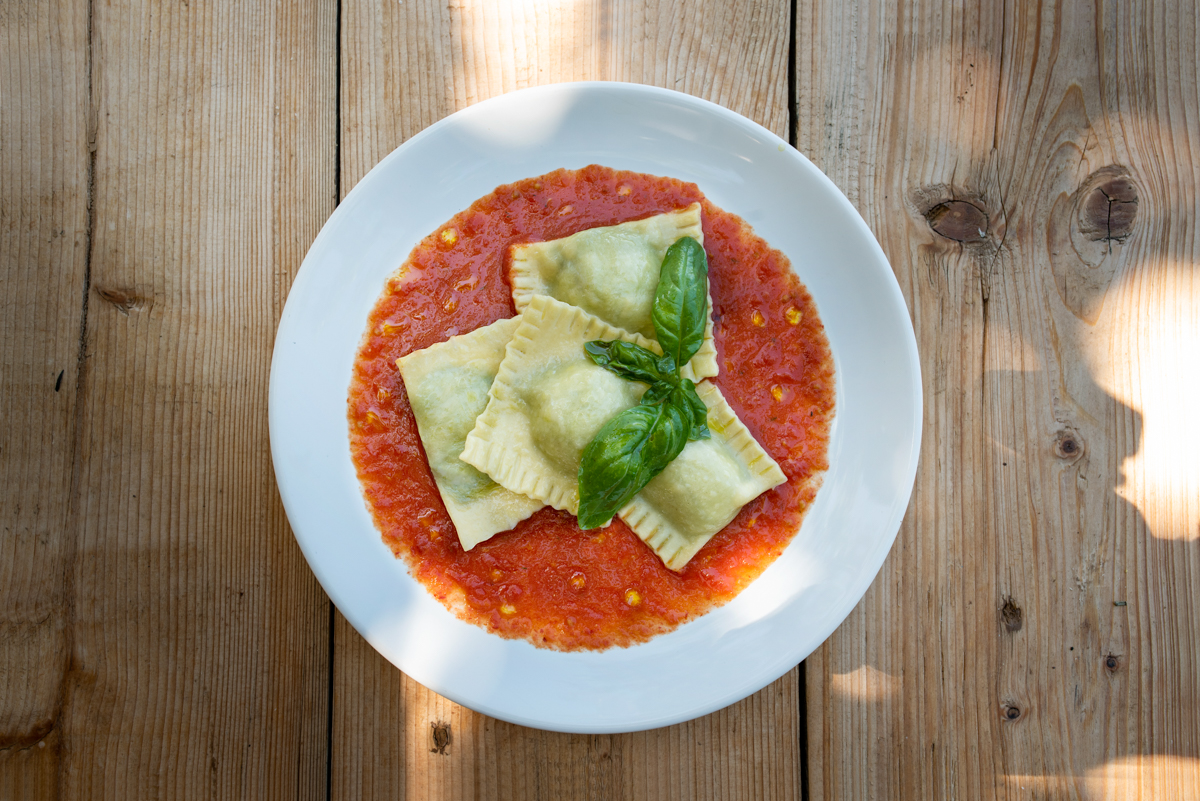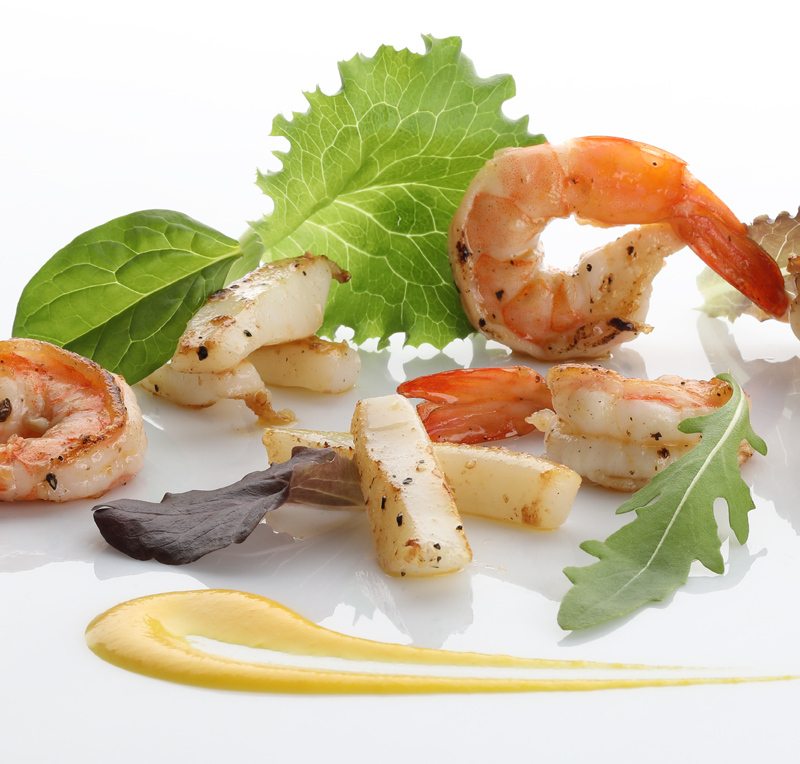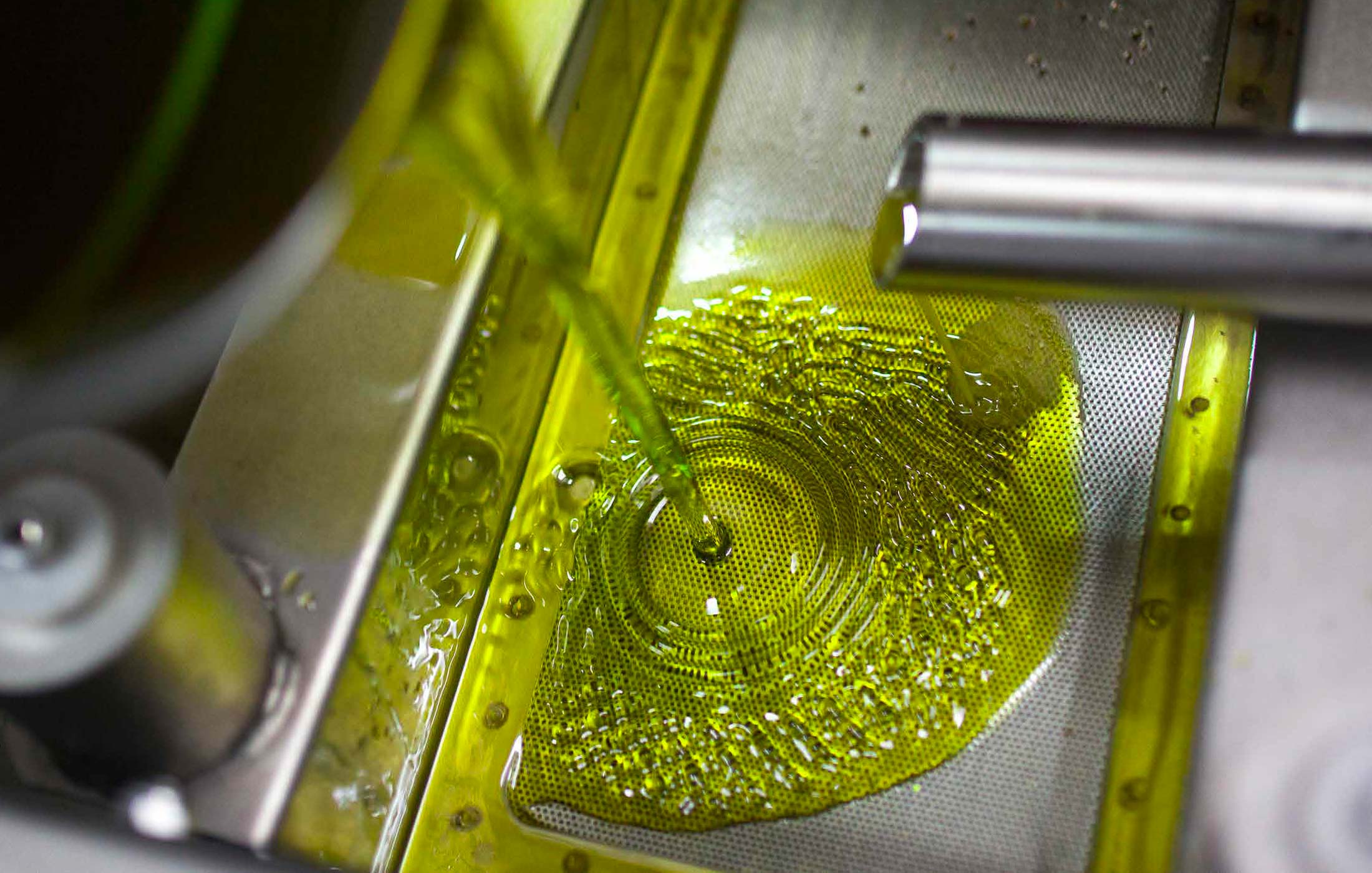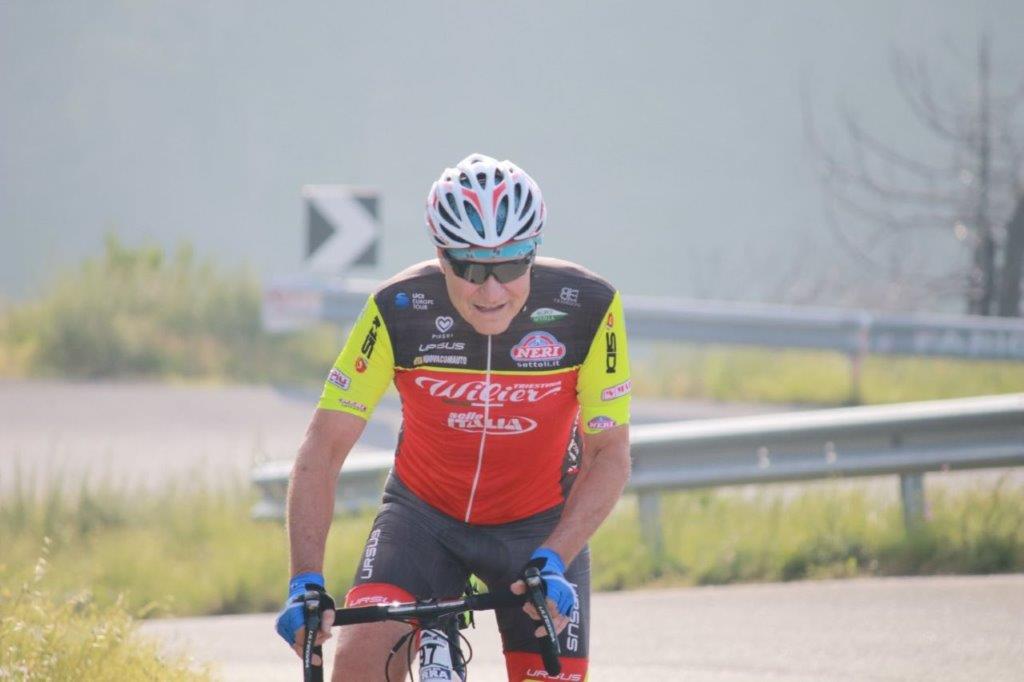Chef Beatrice di Gaetano - La Casa Degli Ulivi
The vegetarian restaurant "The House Of Olive Trees" opens its doors in 2018.
In the kitchen we find Beatrice, as well as sister of our #FRANTOIANICORAGGIOSI Paolo and Simone di Gaetano.
Despite the completely different background, being in fact Beatrice an archaeologist, the girl decides to finally fulfill her father Michele's dream of having a family restaurant.

We are in Castagneto Carducci, near Bolgheri, home of wild boar, meat sauce, cold cuts and cheeses.
Beatrice, however, decides to open a totally VEGETARIAN restaurant, to give a different proposal in the area. But she also does it to follow in the footsteps of her brothers, who have been organizing vegetarian tastings at the olive mill since 1999.

Besides-what could be more vegetarian than OIL?
In addition, Beatrice has always had a great passion for fruits, vegetables and the garden in general. She loves being able to be free to choose ingredients with her own hands. "In our kitchen we use only high quality raw materials, fresh vegetables and eggs, products from the garden that are Kilometer Zero and possibly organic. We like to eat well, live better, with the least possible impact on our planet." this Beatrice tells us.
In fact, their suppliers are all local or regional.
Needless to say, in the kitchen oil is one of the main ingredients, used for all kinds of preparations, from starters to desserts.
Pairings are made according to the dish, and Beatrice gives us a few examples:
Reflections, a light fruity, monovarietal 100% olive oil of the Maurino variety is used on the Panzanella, the flagship of the restaurant's menu.
L'IGP Toscano on the other hand, a much stronger and frank oil, is used on cappellacci with ricotta and for the preparation of pici aglio, olio e peperoncino.
The Grand Cru, a wonderful blend of Frantoio, Moraiolo, Maurino, and Picholine varieties, perfectly enhances the flavor of tortelli stuffed with pappa al pomodoro.


Before leaving us, Beatrice shares one of her simplest and most wholesome recipes, that of Extra Virgin Oil Mayonnaise!
MAIONESE
1 whole egg - 200 ml oil - 1 whole lemon - 1 pinch of salt and pepper (preferably white)
Procedure : put the egg, add the evo oil, lemon, salt and pepper and you blend in blender. Now take a spoonful and TASTE!

GRAN CRU
Gran Cru extra virgin olive oil is Fonte di Foiano's finest production. An intense extra virgin, a blend of the Frantoio, Moraiolo, Maurino and Picholine varieties, it is golden yellow with greenish nuances, clear. From filtration. On the nose it is firm and broad, with hints of artichoke and chicory, enriched by notes of mint, rosemary and sage. The palate is full and complex with tones of lettuce, thistle and hints of black pepper, canella and almond. Powerful bitterness and distinct spiciness.
Buy
IN THE KITCHEN.
It is excellent with octopus appetizers, Chianina meat carpaccio with porcini mushrooms, spinach salads, grilled radicchio, bean soups, pasta dishes with meat sauce, blue fish au gratin, stewed red or black meats, and hard aged cheeses. Excellent for seasoning raw cold and hot dishes with a robust structure. For medium/long cooking at high temperature.
IGP TOSCANO
Toscano IGP is a bold and forthright oil just like the Tuscans. Created from a blend of the most typical native cultivars Frantoio, Moraiolo and Leccino, it is an enveloping oil, characterized by a distinct spiciness. On the nose, it is broad and enveloping, rich in hints of artichoke and wild thistle, flanked by distinct aromatic notes of mint and rosemary. Full and elegant on the palate, with tones of chicory, lettuce and hints of sage, black pepper and unripe almond. Very pronounced bitterness and sharp, well-harmonized spiciness.
Buy
IN THE KITCHEN.
Ideal on roast poultry, fresh string cheese, excellent on shellfish appetizers, steamed beans, tomato salads, marinated amberjack and farro soups. Excellent in risotto with artichokes, on shrimp in guazzetto, with baked turbot and baked rabbit
Orange salad
Orange salad
INGREDIENTS FOR 4 PEOPLE
- 4/5 oranges
- 2 fresh spring onions
- Parsley
- Primo Oil
- Salted capers
- Black olives
- Chili
- halls

PROCEDURE
Peel and cut the oranges into cubes (not too small) and place them in a container. Add finely chopped fresh spring onion (if necessary left to soak in water for a couple of hours or covered with salt and then rinsed before dressing the salad), black olives, desalted anchovies cut into small pieces, and desalted capers. Finally season everything with Primo oil, salt and chili pepper to taste, and chopped parsley.
The salad can be eaten as an appetizer, as a side dish it is a perfect accompaniment to grilled meat or fish, as a main course with the addition of herring or cod or other vegetables such as fennel, olives or valerian.
#FRANTOIANCOURAGEOUS
Let's start by saying a simple thank you to our Courageous Crushers!
Thank you for the hard work you put in each year to give us this elixir of long life!
Thank you for your unwavering passion that allows us to enjoy excellent products!
Thank you for giving up quantity in favor of Quality!
Thank you for protecting extra virgin olive oil, its organoleptic characteristics and health properties!
The Courageous Frantoiani, are lovers and guardians of their land , their traditions, and at the same time, as great entrepreneurs, they know how to break the customs, and interpret with modernity and innovation a product as old as man.
So we want to congratulate you for all you do, for how you do it, for the sacrifices and sleepless nights spent waiting for tomorrow's weather.
Passion has the same Latin root ("pati") as the word patire. He who has passion must be ready to suffer, as he knows well who puts his heart into the things he does.
But the enthusiasm you softly spread for your work reminds us of the etymology of this word, which comes from the Greek En (in) Theòs, (God) ousia (essence) : "having the essence the touch of God within."

Julienne of cuttlefish and shrimp
Julienne of cuttlefish and shrimp with misticanza and saffron sauce
- INGREDIENTS FOR 4 PEOPLE
- 16 large shrimp
- 400 g cuttlefish
- 100 gr misticanza
- 1 zucchini
- 1 sachet saffron
- Extra virgin olive oil L'Ottobratico monocultivar
- b. Mixed pepper
- b. salt
- 250 ml Vegetable broth

PREPARATION
For the saffron sauce: coarsely chop the zucchini flesh. In a pan, pour a drizzle of oil, the zucchini, add a pinch of salt and pepper and cook over low heat until fully cooked. Blend everything together and add the contents of a saffron sachet.
Shell the shrimp, leaving the tail attached; incise the back of the shrimp to remove the gut. Clean the cuttlefish and cut out equal-sized strips for even cooking. Let them rest in a bowl with oil, salt and pepper for a couple of minutes.
Bring a nonstick skillet to temperature and roast the cuttlefish and shrimp, turning them often.
Pleasantly distribute the misticanza on the plate, lay the cuttlefish fillets and shrimp tails and garnish with drops of saffron sauce and a drizzle of Ottobratico evo oil.
Oil in the sports diet
We hear a lot about balanced diet, but do we really know what it is?
More than a diet, it should be understood as a lifestyle. It is a balanced, healthy and sustainable eating pattern over time, based on the consumption of every macronutrient at every meal, from breakfast to dinner.
All meals should be balanced.
Even a sportsman or gym and fitness enthusiast needs to eat a varied and balanced diet consisting of lipids, carbohydrates and proteins. Therefore, it is essential to choose the "right" fats to add to one's diet, which are able to provide high levels of "ready-to-use" energy and allow the assimilation of fat-soluble nutrients. Fats are a fundamental source of energy for athletes and are an important reserve especially for endurance and endurance sports .
Extra virgin olive oil, thanks to its valuable properties, is definitely an excellent choice. Low in saturated fatty acids to the advantage of unsaturated ones, one of the most important substances for preventing cardiovascular disorders and for the functioning of metabolism.

To reap the maximum benefits and keep all the properties intact, however, it is recommended to consume it raw as a seasoning on preparations, or at any rate cooked at low temperatures.
Extra virgin olive oil is also notable for the amount of polyphenols, molecules with high anti-inflammatory properties and capable of protecting human cells from oxidative stress. Olive oil is also a natural source of vitamin E, fights free radicals, which increase with the performance of sports activity, and is an important cancer prevention tool. Finally, it also helps to better assimilate vitamins found in other types of foods, such as fruits or vegetables. These vitamins are only fat-soluble, meaning they are not absorbed by the body if there is a lack of fat: therefore, it is essential to season with extra virgin oil.
Sports and nutrition go hand in hand: the properties of this type of oil therefore make it particularly suitable in the diet of athletes, counteracting and repairing tissue damage, helping in the alleviation of inflammation and muscle injuries. Several studies have shown that during intense physical activity it increases oxygen consumption by the muscle and the production of free radicals, creating a state of oxidative stress.

Interview with Johnny Madge
Johnny Madge arrived in Italy in 1982, and his passion for oil began almost immediately.
Telling us when and why he fell in love with oil, Johnny recalls an invitation to a lunch in Umbria.
He finds a bottle of new oil at the table, and notices that his diners, in addition to using it on bruschetta (which he already knew), also use it on a bean soup, and later, to his surprise, on a grilled steak! He then realized that for many Italians, oil is not just another ingredient.
In the English culinary tradition, in fact, oil was not widely used; Johnny remembers that when his grandmother wanted to buy it to cook her typical Greek dishes, she had to go to the pharmacy and buy small bottles.
Four years after this famous lunch, Johnny decides to buy a house in Sabina, near Rome.
He finds an abandoned farmhouse in the middle of an olive grove, starts tasting various local oils, and tells his wife that before he buys a house there, he wants to taste the oil from his farmhouse.
The oil is good and Johnny buys the house. He continues to make oil for years, but admits that it was not really very good.
In 2002 he decided to open an oil shop, where after a short time a Slow Food expert visited, who realizing Johnny's passion for the product, suggested that he make some oil presentations to locals.
His first assignment was in a restaurant, and it involved covering bottles with aluminum foil so that the tasting would be in the "dark."
As the only Englishman, he himself admits to feeling uncomfortable, as if the others did not trust him.
The following year they test him, and offer him a few tastings. Again he feels a lot of pressure, but shows that he is very capable.
Step by step Johnny makes the acquaintance of many experts and continues to work for Slow Food another 6 years. With them he participates in an event where he makes the acquaintance of the editor of Gambero Rosso, who asks him to participate as a taster at event in Molise, an event where he meets Curtis Cord, who in turn invites him to New York for the New York Olive Oil Competition, to talk about oil.
In the Big Apple he met an American juror who invited him to Japan on the jury.
Next he was invited to Greece, London, Turkey, Berlin, and now he is also on the jury in Australia.
From November he will work in Lesvos, Greece, as a food guide, particularly in the oil sector.
It is evident that from his small farmhouse in Sabina, Johnny has come a long way.
Now Johnny to pass on his passion to others, he organizes online tastings, where he uses the Opera Olei Box in order to take a virtual tour of the whole of Italy, from North to South.
In fact, the Box features six different oils, six different regions and six different cultivars.
This makes it possible for him to have people taste very different products.
Johnny during the tasting tries to use very simple language so that it is understandable even to novices.
He talks about the producers, the difference in the various cultivars, and explains all the benefits of the oil, but is keen to point out that it can also have flaws, such as sludge.
He gets right back on the "positive" as he puts it, and directs customers on how to use it in the kitchen. Because every oil has its own dish, as the brochure inside the box set perfectly illustrates, which Johnny suggests reading and studying carefully!
For more information, visit:
http://www.johnnymadge.com/
http://www.johnnymadge.com/online-olive-oil-tastings/
Interview with Luca - Bar Buffet at Aurelio's
The OliveVive newspaper this time decided to tell you about a small Livorno establishment, Bar Buffet da Aurelio al Cisternino.
Luca, the owner, tells us how his passion for extra virgin olive oil began, and how things have changed since he has been using it in his kitchen.
Luca comes from a farming family from the Marche region, which moved to Livorno and decided in 1962 to open a new business. They offer sandwiches and homemade dishes related to tradition, with special attention related to the quality of the product.
Riccardo Scarpellini, a simple and elusive customer of the Bar, starts "courting" Luca - as he himself tells us - and every time he goes to lunch with him he leaves a bottle of oil on his table, saying : "Luca, taste it."
Taste after taste, Luca falls in love with this product and realizes that there really are categories, and that the oil proposed by Riccardo is of a higher category than all the others.
But why specifically oil? Because Luca's cooking is simple, and simple things are always the best, and if they are excellence they are even better.
Luca defines oil as "the excellence of simplicity." And that is so true.
The decisive, breakthrough moment, dare we say it, is when he starts using it in cooking, both cooking and raw. He sees a truly remarkable change and realizes that not everything goes well on everything: an example?
Coratina does not go well on a spaghetti all'olio, but when it seasons a soup it feels its full power.
Luca in town is especially known for two delicacies: porchetta and bread and tomato.
He tells us that he used to cook porchetta in seed oil, now he uses extra virgin for that as well. The difference? The processing waste, formerly black, now transparent.
And then comes bread and tomato-the epitome of simplicity.
Luca serves his customers simple bread and tomato and asks them to smell, then seasons with a drizzle of Primo dei Frantoi Cutrera, and asks them to do it again. Here is where the quantum leap happens, the oil enhances a simple dish and makes it pure poetry.
Finally, we ask if he now directs his customers to celta of oils and these are his suggestions:
Titone Blend on boiled cannellini beans, Coratina on soups, Costa del Riparo by Marco Viola and Primo by Frantoi Cutrera on bread and tomato, and finally Riflessi by Fonte di Foiano on grilled and baked vegetables.
Interview with Alessandro Camici - OILBAR of Livorno
Alessandro's passion for oil began as a boy, when his father took him and his brother around the olive mills of Tuscany. The curiosity for this product is great, but the knowledge still too little.
In 1997/98 he tries for the first time to sell quality oil, but with poor results; perhaps he is not yet ready, or perhaps it is not the time.
But Alexander does not give up, and throughout his career he meets many industry experts and prominent personalities who, combined with his passion, contribute to his professional growth.
The breakthrough year is 2014, when thanks to meeting Riccardo Scarpellini, Alessandro decides to transform his bar in Livorno's Vettovaglie market into the Oil Bar.
The first producers he is lucky enough to meet are Americo Quattrociocchi and Giorgio Franci, who take him by the hand and introduce him to the wonderful world of oil.
He decided to take other products out of the store to dedicate himself and specialize in this area.
Alessandro now personally tastes hundreds of products, which he then carefully selects to offer his customers true excellence. Now thanks to the many courses he has attended, his studies and the right knowledge gained over the years, he is able to advise his customers on the best combination of oil and food.
He admits-as he confides to us-that he takes up to half an hour to sell a bottle of oil, this is because his purpose is to inform the customer of the product of excellence he is presenting to him.
Having made the acquaintance of Marco Oreggia," explains Alessandro, "has been a blessing. Marco has helped introduce a large number of Italian producers, some of the best on our peninsula.
The Oil Bar is now also known abroad; in fact, it ships products all over the world.
In 2017 he was awarded by Flos Olei as the best oil bar, and in 2018 he received the award named after Cristina Tiliacos as an oil ambassador-a great honor and excitement for Alessandro.


Interview with Michele Pincelli - Our Oil Tasters
Michele is one of our Oil Tasters, who with passion and dedication selects the best extra virgin olive oils for you.
In this short interview he tells us his story.
How did your passion for oil start and why did you want to take this path and become a taster?
I cannot say that my "love affair" with extra virgin was born with a bolt of lightning. In fact, I have to admit that when I first started working with FJT, the year 2008 was running, the unbridled passion towards what to me was a simple condiment made me skeptical to say the least.
It was then time, the chance to meet great oil masters and work side by side with passionate and experienced colleagues, that made me fall madly in love.
Lorenzo Trinci at FJT was the first official taster laid the path for me, Angela, Simona, Matteo, Costanza and Chiara.

How does one become a taster?
The first step we described earlier! Surely we must be in love with the oil!
One must then enroll in and attend an official course for Aspiring Olive Oil Tasters and obtain a certificate of Physiological Suitability for Tasting.
This must then be followed by 25 tasting sessions with an official panel before one can join the National List of Olive Oil Technicians and Experts.
That done, all that remains is to keep tasting every day to improve and keep in training...the palate can eventually be compared to a muscle!
If then, like me , you are lucky enough to be able to taste oil every day together with a group of experts and have colleagues who are part of official panels, it is all easier.
At FJT we bring the tasting panel together at least 2-3 times a week, and together with everyone on the farm who has passion, and who will soon take the path, we taste oils that come from farms all over the world. My hope is that within a few years we will have a Panel Leader, and that we can create an official in-house panel.
What does the oil tasting technique consist of?
How to taste.....first of all we must understand that an oil is tasted and evaluated with the nose and mouth, never with the eyes.
If an oil has a light color tending to yellow, it does not mean that it is worse than a deep green one. Color depends on many factors, cultivar first and foremost, and should not concern a taster. The oil should be warmed slightly so that the aromas, the "fruitiness" to use the correct terminology, are better perceived. One brings the glass to the nose and inhales deeply, best if the operation is also repeated using one nostril at a time. The nose is then assessed for fruitiness and "freshness," thus whether an oil is a green or ripe or even defective fruitiness.
A small amount is then placed in the mouth and a so-called "stripping" is performed, that is, an inhalation of air that allows the oil to flow over the palate until it reaches the retronasal area and confirms the olfactory sensations obtained previously.
This will also allow us to evaluate the two fundamental parameters such as Bitter and Spicy, two attributes that MUST be present in an extra virgin oil.
Based on what is an oil classified (light fruity, medium, intense ...)?
The technique we have just described is used by tasters in the first instance to check for the absence of a defect, i.e., a negative characteristic ( rancid, warming, mold....), a necessary condition for an oil to be called extra virgin.
We then evaluate the level of olive fruitiness with values from 0 to 9, which will also allow us to evaluate the category of fruitiness ( green or ripe ) and intensity : light up to 3, medium up to 6, intense above 6. For bitter and spicy, intensity is also evaluated using the same scale.
It is important to keep in mind that a more intense oil is not necessarily a better oil.
After this we enter the 'realm of scents and from here the poetry begins....
Francesca De Ritis
Francesca De Ritis, has been working in the olive oil industry for about 20 years, initially as a passionate grower of family olive groves in Abruzzo. She selects, imports and distributes excellent extra virgin olive oil in Holland, the country where she has lived for a long time.
She is a professional O.N.A.O.O. taster and coach for Olivevive in online tasting classes.
He has knowledge and experience on the entire olive oil supply chain, starting from the field and milling to marketing and distribution. He is involved in training and consulting for professionals and operators in the industry as well as EVO oil amateurs and enthusiasts, and devotes much time and passion to educating people about the consumption of quality extra virgin olive oil.
In love with Italian olive biodiversity and beyond, she is determined to spread the culture of quality extra virgin olive oil around the world.
He is a juror in some major international oil competitions.







